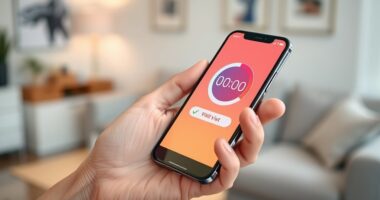To stay organized as a caregiver, use medication management apps to track prescriptions and set reminders. Task organizers help coordinate schedules, appointments, and chores, while secure messaging tools facilitate communication with healthcare teams. Note-taking apps record care details and observations. Emergency alert apps provide quick notifications during urgent situations. Wellness and support apps also help you prioritize self-care. Keep exploring to find the best tools tailored to your caregiving needs.
Key Takeaways
- Medication management apps track prescriptions, set reminders, and share records securely with healthcare providers.
- Task organizers and shared calendars coordinate appointments, chores, and caregiving responsibilities in real-time.
- Secure messaging and emergency notification tools facilitate quick, encrypted communication with healthcare teams and loved ones.
- Safety and wellness features promote consistent routines, emotional support, and burnout prevention for caregivers.
- Additional apps offer resource management, environmental considerations, and support tools to enhance overall caregiving efficiency.
Best Medication Management Apps for Caregivers
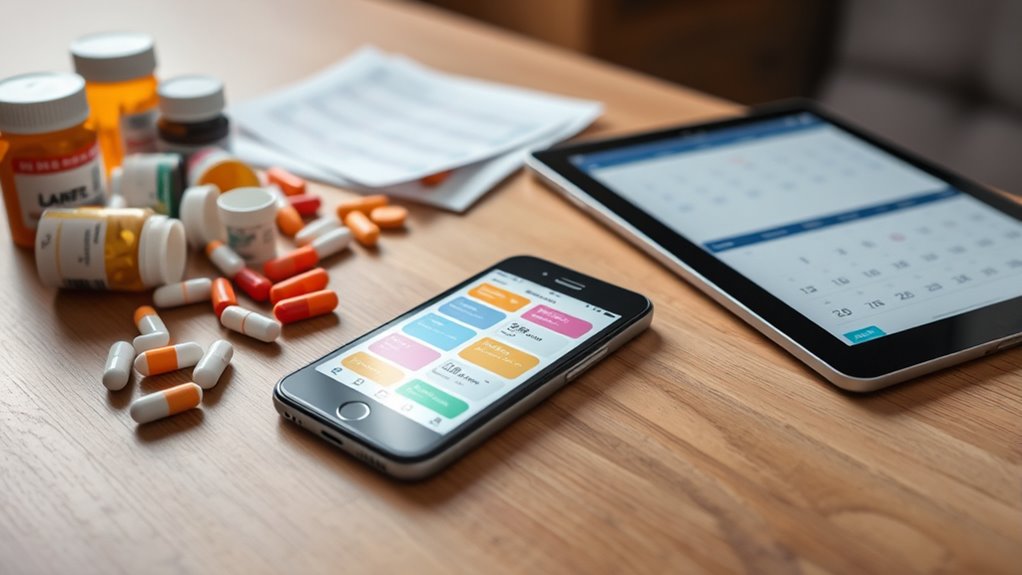
Managing medications can be overwhelming, but the right app can make all the difference. Medication tracking and pill reminder apps help you stay on top of your loved one’s medication schedule, reducing the risk of missed doses or overdoses. These apps allow you to set customized reminders, log medication intake, and monitor adherence easily. With features like refill alerts and dosage instructions, you gain peace of mind and better control. Many apps also offer medication lists that you can share with healthcare providers, ensuring everyone stays informed. Choosing a reliable pill reminder app simplifies your caregiving responsibilities, making medication management more organized and less stressful. Additionally, privacy policies ensure your data is protected while you manage sensitive health information, providing further peace of mind. Implementing secure data protection measures further safeguards your personal information during this process. Using apps with reminder notifications can help prevent missed doses and keep your loved on track.
Task and Schedule Organizers for Caregiving Responsibilities
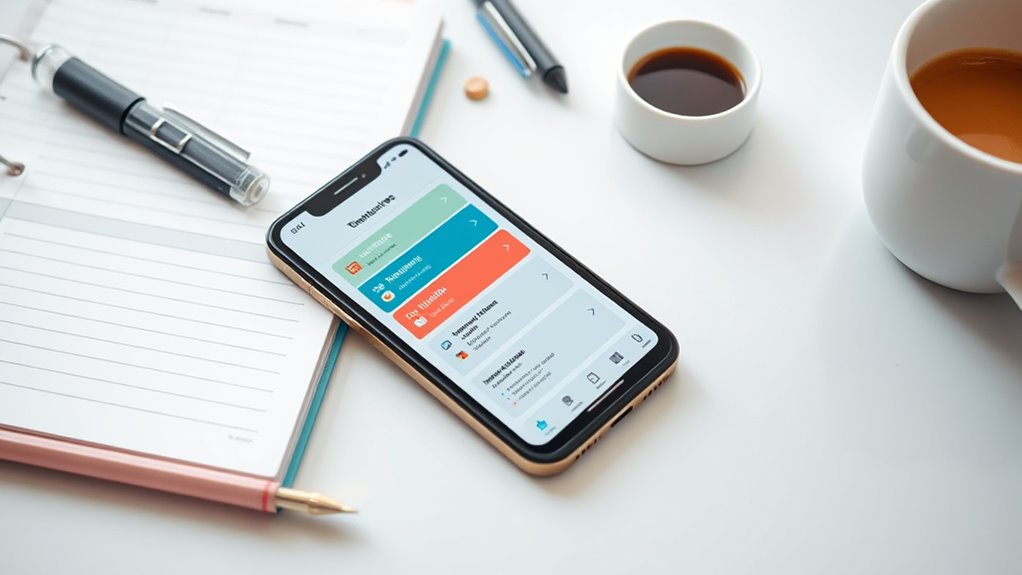
Using shared calendars helps you coordinate caregiving tasks with others easily. Custom reminders guarantee you never forget important responsibilities or appointments. These tools keep your schedule organized and your tasks on track. Additionally, choosing reliable and trustworthy brands ensures the tools provide accurate and effective support for your caregiving needs. Implementing necessary cookies can enhance the functionality of these apps by enabling features like secure log-ins and personalized settings. Recognizing the importance of privacy management, these apps often allow you to customize your cookie preferences to protect your sensitive information. Considering contrast ratio can help you select apps with clearer interfaces, making it easier to view schedules and notifications. Moreover, understanding city dynamics can help caregivers better navigate local resources and community services to support their loved ones effectively.
Shared Calendars for Coordination
Shared calendars are essential tools that enable caregivers to coordinate tasks and schedules seamlessly. They promote family collaboration by allowing everyone to view upcoming appointments, medication times, and daily responsibilities in one place. With shared calendars, you can easily assign tasks, set deadlines, and guarantee that caregiving duties are distributed fairly. This helps ensure that caregiving responsibilities are managed efficiently and that no important task is overlooked. This coordination can significantly decrease the risk of missed appointments, which is a common concern among caregivers. Proper scheduling also helps manage nutrient intake by reminding caregivers of meal and supplement times, thus supporting overall health. Incorporating vertical storage solutions and other organization strategies can further streamline your caregiving space, making it easier to access essential supplies and documents. This promotes scheduling consistency, reducing confusion and missed commitments. Whether you’re managing doctor visits, medication reminders, or daily chores, these calendars keep everyone on the same page. Many apps allow real-time updates, so changes are instantly visible to all family members. By utilizing shared calendars, you create a transparent, organized system that supports your caregiving responsibilities and strengthens family cooperation.
Custom Reminders for Tasks
Custom reminders enhance caregiving organization by making certain that no task slips through the cracks. With personalized task alerts and customizable reminder settings, you can tailor notifications to fit your schedule and priorities. These reminders can be set for medication times, appointments, or daily chores, helping you stay on top of essential responsibilities. Imagine receiving alerts that adapt to your routine, reducing stress and preventing missed duties. You might see:
- Alerts that prompt you hours or minutes before a task
- Reminders that repeat daily, weekly, or as needed
- Custom sounds or vibrations for different alerts
- Priority settings to highlight urgent tasks
Using these features, you keep your caregiving tasks organized and ensure important responsibilities are never overlooked. Incorporating time management strategies can further improve your efficiency and reduce overwhelm. Frozen yogurt can be a healthy and refreshing treat to share during breaks or special moments. Custom reminders make managing your caregiving duties more manageable and less overwhelming, especially when considering environmental impacts and the importance of sustainable practices in daily routines. For example, setting reminders for emotional awareness can help you recognize signs of caregiver burnout and seek support when needed.
Communication Tools to Stay Connected With Healthcare Teams
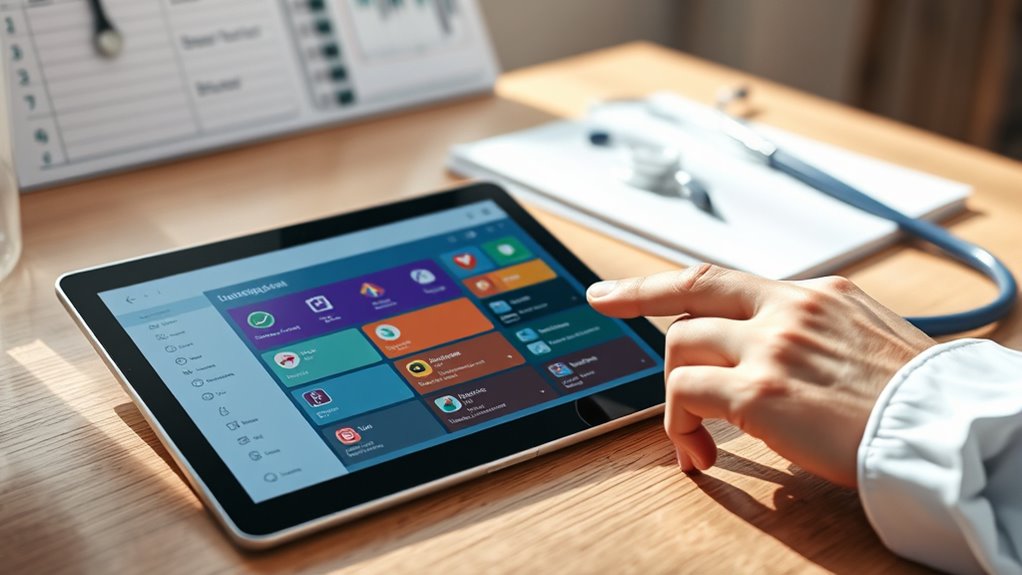
Effective communication with healthcare teams is essential for quality care. Using secure messaging platforms, shared care calendars, and emergency notification systems helps you stay informed and responsive. These tools guarantee you can coordinate quickly and keep everyone on the same page. Incorporating eye patches into your routine can also enhance the overall appearance of caregivers, contributing to improved confidence and well-being. Additionally, understanding the importance of privacy policies ensures that sensitive health information remains protected during these communications. Studies have shown that hydrocolloid technology significantly promotes healing by drawing out impurities, making these tools even more effective in patient care. Moreover, utilizing reliable hours listed by retail stores can help caregivers plan their visits more effectively, reducing wait times and ensuring timely access to necessary products and services. Additionally, utilizing self watering plant pots as a metaphor can remind caregivers of the importance of consistent and reliable support systems in healthcare management.
Secure Messaging Platforms
Secure messaging platforms have become essential tools for caregivers who need to stay connected with healthcare teams. They allow quick, direct communication, ensuring you receive timely updates and instructions. When choosing a platform, consider features like:
- End-to-end encryption to protect sensitive information
- Secure login options for privacy concerns
- Compatibility across devices for convenience
- Clear audit trails for documentation
These features help address privacy concerns and meet encryption standards, safeguarding patient data. Using these platforms, you can discuss medical updates, ask questions, or share photos securely. They reduce the risk of miscommunication and keep your conversations confidential. With reliable, encrypted messaging, you stay connected with healthcare providers confidently, knowing your privacy is prioritized. This peace of mind is vital when managing complex care plans and sensitive health information. Additionally, regular inspections of devices and adherence to manufacturer guidelines further help maintain safety and security in digital communications. Maintaining up-to-date software ensures that security vulnerabilities are minimized, further protecting sensitive health data.
Shared Care Calendars
Shared care calendars are invaluable tools that help you coordinate appointments, medication schedules, and care tasks with healthcare teams. They streamline caregiver scheduling, ensuring everyone stays on the same page and reducing confusion. With a shared calendar, you can easily update and track upcoming doctor visits, therapy sessions, or medication changes, keeping the entire care team informed in real-time. This promotes better family coordination, so relatives and other caregivers know their responsibilities and can plan accordingly. Many apps allow you to set reminders and send notifications, minimizing missed appointments or medication errors. By keeping everything organized in one accessible place, shared care calendars help you manage your loved one’s care more effectively and reduce stress for everyone involved. Recognizing patterns in scheduling can also help identify potential issues before they arise, enhancing overall care quality.
Emergency Notification Systems
Building on the organization provided by shared care calendars, emergency notification systems guarantee that healthcare teams are instantly alerted during urgent situations. These tools enhance your emergency preparedness by facilitating rapid crisis communication, ensuring everyone stays informed. When a crisis strikes, you can rely on these systems to send immediate alerts via text, email, or app notifications. This quick response can be crucial for coordinating care, summoning help, or providing critical updates. Visualize receiving a push notification that instantly alerts your medical team of an emergency, allowing for swift action. Features often include:
- Instant alerts via multiple channels
- Customizable emergency contact lists
- Real-time updates on patient status
- Secure communication with healthcare providers
Note-Taking and Record-Keeping Apps for Care Details
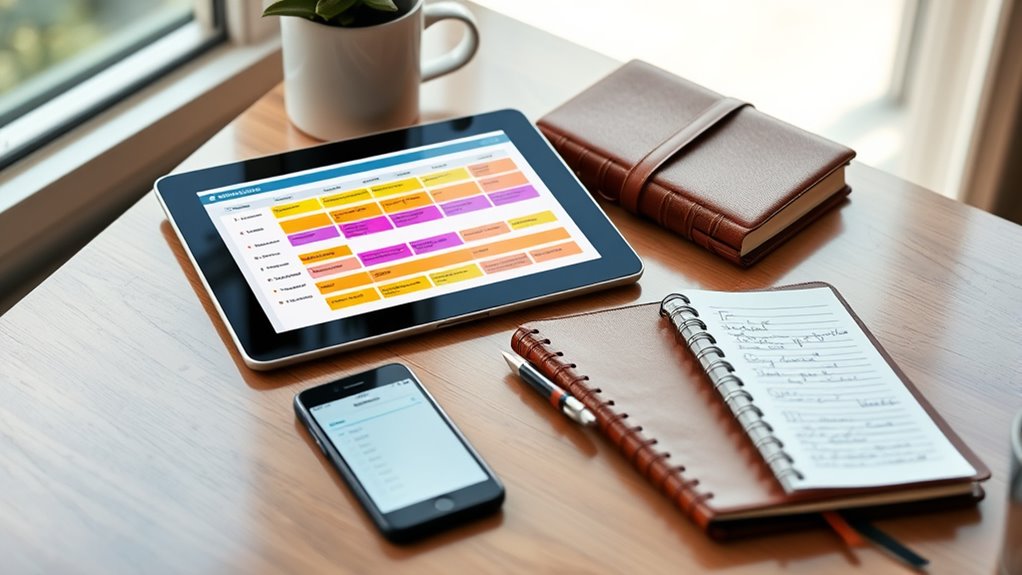
Keeping track of care details is essential for providing consistent and effective support, and note-taking and record-keeping apps make this task much easier. Digital journaling allows you to log daily updates, track changes, and reflect on care routines in one organized space. Voice note apps let you quickly capture observations or instructions on the go without typing, ensuring no detail is missed. These tools help you document medication schedules, behavioral patterns, or special needs, creating a thorough record to share with healthcare professionals or other caregivers. By using these apps regularly, you maintain clear, accessible records that improve communication and ensure continuity of care. Staying organized with note-taking and record-keeping apps ultimately leads to better support and peace of mind.
Emergency and Safety Alert Applications
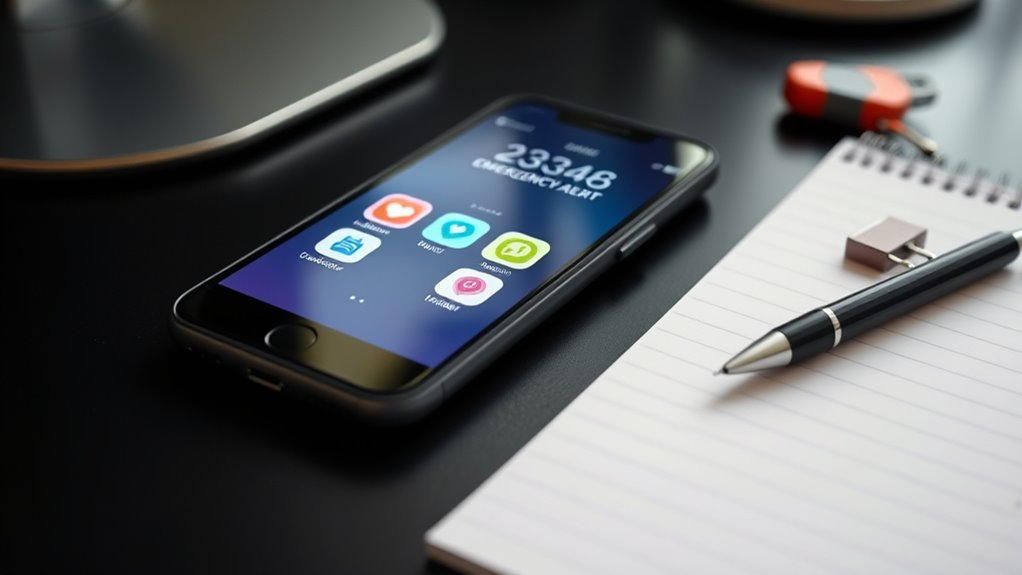
Having detailed records of care routines is essential, but being prepared for emergencies is equally important. Emergency and safety alert applications help you respond quickly, ensuring personal safety and effective emergency preparedness. These apps often feature instant alerts, location sharing, and direct lines to emergency services. With a tap, you can notify loved ones or authorities during a crisis, reducing response time. Envision this:
- Sending real-time alerts with your location
- Notifying family members immediately
- Accessing emergency contact lists quickly
- Receiving safety tips during crises
These tools empower you to act swiftly, providing peace of mind that you’re prepared for any situation. By integrating these apps into your caregiving routine, you enhance safety and demonstrate proactive emergency preparedness for your loved ones.
Wellness and Support Apps for Caregiver Self-Care
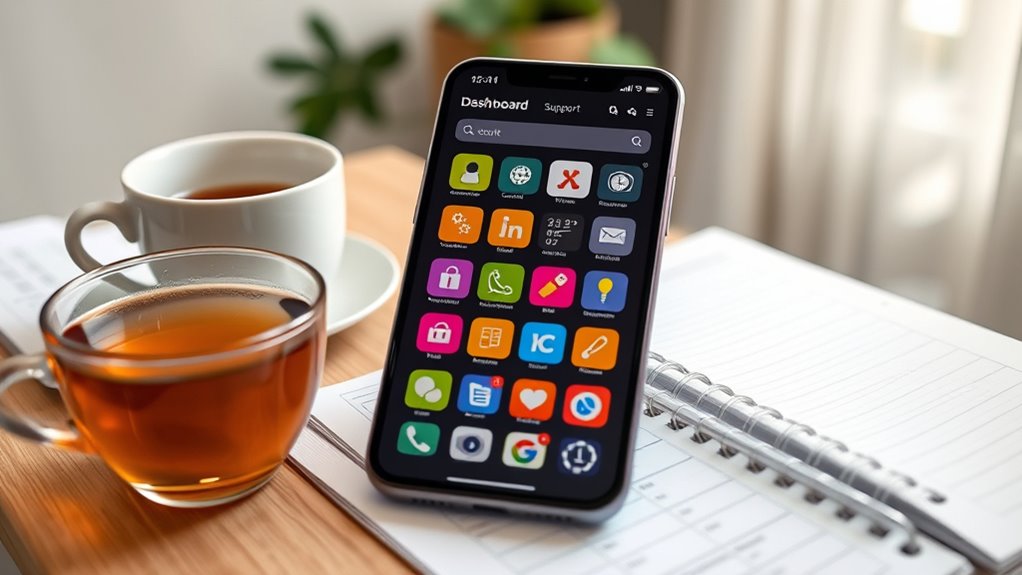
Ever wonder how to prioritize your well-being amid the demands of caregiving? Wellness and support apps for caregiver self-care can make a difference. These apps often include mindfulness practices that help you manage stress and stay grounded. You can set aside moments for meditation or breathing exercises during busy days, improving your mental clarity. Additionally, many apps connect you to caregiver support groups, providing a sense of community and understanding. Sharing experiences with others who face similar challenges can boost your emotional resilience. These tools remind you to care for yourself, not just the person you’re caring for. Incorporating wellness and support apps into your routine helps balance caregiving responsibilities with essential self-care.
Frequently Asked Questions
How Do I Choose the Best App for My Caregiving Needs?
When choosing the best app for your caregiving needs, consider its user interface—make sure it’s easy to navigate and suits your tech comfort level. Look for app customization options so you can tailor features to your specific responsibilities. Test a few options to see which one feels intuitive and meets your daily demands. Prioritizing these aspects helps you find a caregiving app that’s practical, efficient, and truly supportive.
Are These Apps Suitable for All Age Groups?
When considering if these apps are suitable for all age groups, think about age appropriateness and your tech familiarity. Some apps are user-friendly and designed for seniors, while others may require more tech skills. You should evaluate each app’s interface and features to see if they match your or your loved one’s comfort level with technology. This way, you guarantee effective use and better caregiving support regardless of age.
Can These Apps Be Used Offline During Emergencies?
Think of apps like a lifeboat, reliable even when the storm hits. Many caregiving apps offer offline functionality, so you can access crucial info during emergencies. This guarantees emergency access when internet fails, just like a flashlight works in a blackout. Always check app features before relying on them, so you’re prepared to help your loved ones no matter the situation. Your preparedness can make all the difference.
How Secure Is My Personal Health Information in These Apps?
You might wonder how secure your personal health information is. These apps often use data encryption to protect your data and follow strict privacy policies to safeguard your information. However, always review the app’s security features and privacy policies yourself, as security can vary. Stay cautious, keep your app updated, and only share essential details to guarantee your health data remains protected.
Are There Free Options Available for Caregiver Apps?
Imagine finding a hidden treasure chest of tools without digging into your wallet. Yes, free alternatives exist, offering budget-friendly options for caregivers. These apps act like trusty sidekicks, helping you manage appointments, medication schedules, and tasks without costing a dime. While they may not have all the bells and whistles, they’re perfect for staying organized without breaking the bank, turning chaos into calm with just a few clicks.
Conclusion
Staying organized as a caregiver can feel overwhelming, but these apps prove you don’t have to do it alone. They embody the idea that technology can be a powerful partner in caregiving, turning chaos into clarity. Remember, just like a well-maintained garden thrives with care, your well-being and your loved one’s health flourish when you leverage the right tools. Embrace these apps—they’re your allies in this meaningful, challenging journey.




